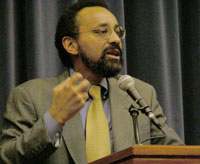Berkeleyan
New Boalt dean meets, greets
Students welcome Edley with a standing ovation — and great expectations
![]()
| 18 February 2004
| |  Dean-designate Christopher Edley, Jr. Bonnie Azab Powell photo |
At an informal town-hall meeting last week, Christopher Edley, Jr., the incoming dean of Berkeley’s Boalt Hall School of Law, was welcomed with a standing ovation, T-shirts, and flurry of questions from students.
“Extraordinary times call for extraordinary measures, and I’m proud to say we’ve found an extraordinary dean,” said Boalt’s interim dean, Robert Berring, in an introduction nearly drowned out by audience applause.
Edley, named dean in December 2003, has taught law at Harvard Law School since 1981 and is a leader in the application of civil-rights law to public policy. He is founding co-director of the Civil Rights Project at Harvard; the project’s research and policy papers have played important roles in Supreme Court hearings and federal policy decisions.
“We’re all incredibly excited to have someone in academia who also works so directly on policy at the national level,” said Marc Tizoc Gonzalez, a second-year Boalt Hall student in the audience. “[Edley] makes me think that this law school could actually fulfill its mandate as a public institution, to bring together science and research with practical policy to advance public interest. Maybe that’s a lot to put on one person, but that’s what we hope.”
Though he won’t officially start as dean until July 1, Edley has already hit the ground running. Taking the podium in a suit paired with white jogging shoes, he turned the standing ovation into a joke. “Yes, I’ve got an expectations problem,” he said, before proceeding to lay out his vision for change at Boalt.
The backbone of that vision is a very ambitious fundraising campaign to make up for dwindling state support. Edley said that his only moment of “buyer’s remorse” since taking the job in December was learning of Governor Arnold Schwarzenegger’s plan to cut funding for higher education while steeply raising fees for graduate students. “This to me poses a grave threat to the character of this university and this school,” he said somberly. “The harsher reality is, this situation is not going away. Even if we get past the next two years of state-budget chaos, the long-term pattern in California is for decreasing public commitment to education, including higher education. I do not see golden days on the horizon.”
He noted that Boalt Hall’s last fundraising campaign had a goal of around $14 million — compared with a mammoth $400-million campaign currently under way at Harvard Law School — and said he has already begun seeking advice about fundraising strategy from Boalt’s most loyal alumni. “This is more than a matter of fixing potholes,” he emphasized. “It’s doing some things that I think are critical to assure the continued excellence at Boalt.”
As Edley sees it, that excellence has three components: “Preparing leaders for all the communities in the world”; “the production of knowledge and the breadth of the curriculum”; and public engagement, drawing on the first two strengths Boalt Hall scores an A+ in the first area, praised Edley, who added: “The good news is that the students here are phenomenal. The extraordinary energy and enthusiasm you have about things in the outside world and also about Boalt is an amazing resource.” For the second, Edley said that as the law becomes more specialized, the “intellectual portfolio of the faculty needs to be broader and deeper, and that means we need to grow the faculty” — which means raising money. Lastly, he wants Boalt Hall to combine the first two areas’ strengths in order to address the most important problems facing California, the nation, and the world: “I want everyone to appreciate that what we’re about here includes an engagement on things that matter.”
After 20 minutes, Edley took questions from the students in the audience. The first student asked whether he planned to open a center for civil-rights research, as was being rumored. He confirmed that he had been asking Boalt Hall faculty whether they would be interested in such a project, and that the response had been so overwhelmingly positive that he will be getting it off the ground as soon as possible. He had already told financial supporters of the Civil Rights Project at Harvard, who were concerned about the effect of his departure, that “CRP’s going to be bigger, better, and bicoastal.” With California at “ground zero for the racial and ethnic changes sweeping America, [the donors] understand and appreciate” the importance of opening a sister center, he said.
Edley then fielded questions about bolstering Boalt’s international-law program and offering forgiveness for private loans to students who work as low-paid public-interest lawyers. His response to the latter was surprisingly pessimistic: a campaign to raise money from alumni at Harvard for the same purpose had fallen “flat on its face,” although he hoped that Boalt Hall alumni might take a different attitude.
Boalt students seemed just as excited about their new dean after the Town Hall as they had been before. “The law can be very conservative, and what’s great about Edley’s appointment is that he represents change,” said second-year law student Daniel Hutchinson. “He seems committed to addressing the problems, and interested in hearing what the students have to say.”
In an interview in what would become his new offices, Edley acknowledged that these great expectations can weigh heavily. “But it is vastly preferable to having the opposite problem,” he said. “I’m at the point in my career where I’m not that worried about failing. If it happens, it happens. This is one of those situations where if you are timid in your ambitions, then you fail to generate the excitement that is essential for success. I think boldness is warranted not only by the challenges, but as the necessary strategy for attracting the support we need.”

